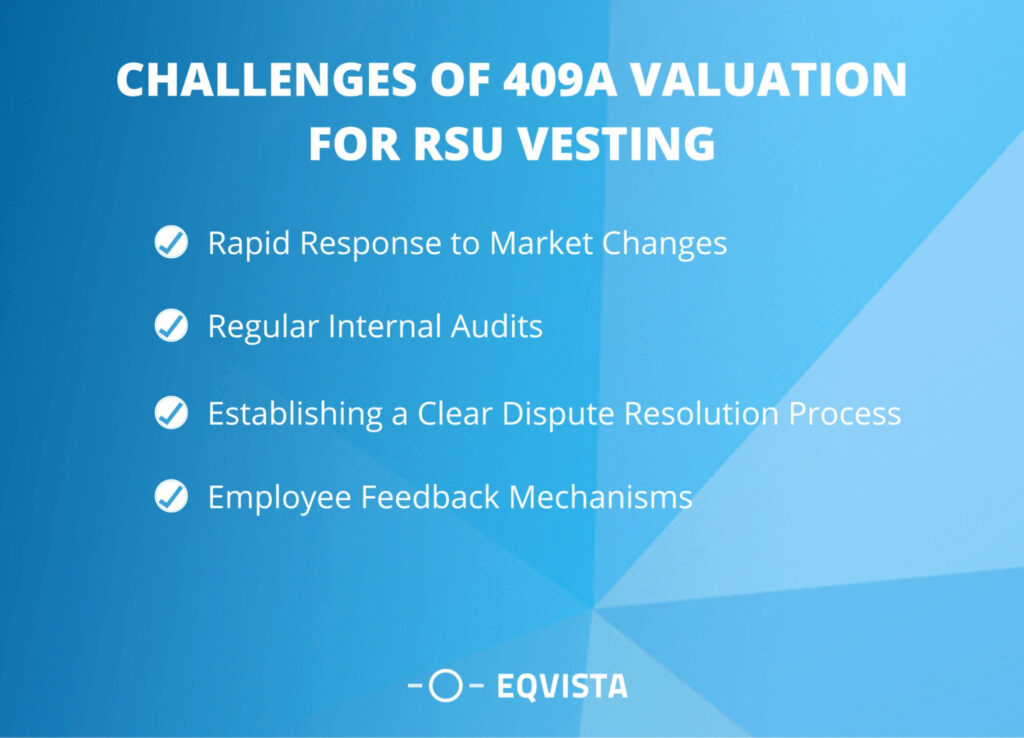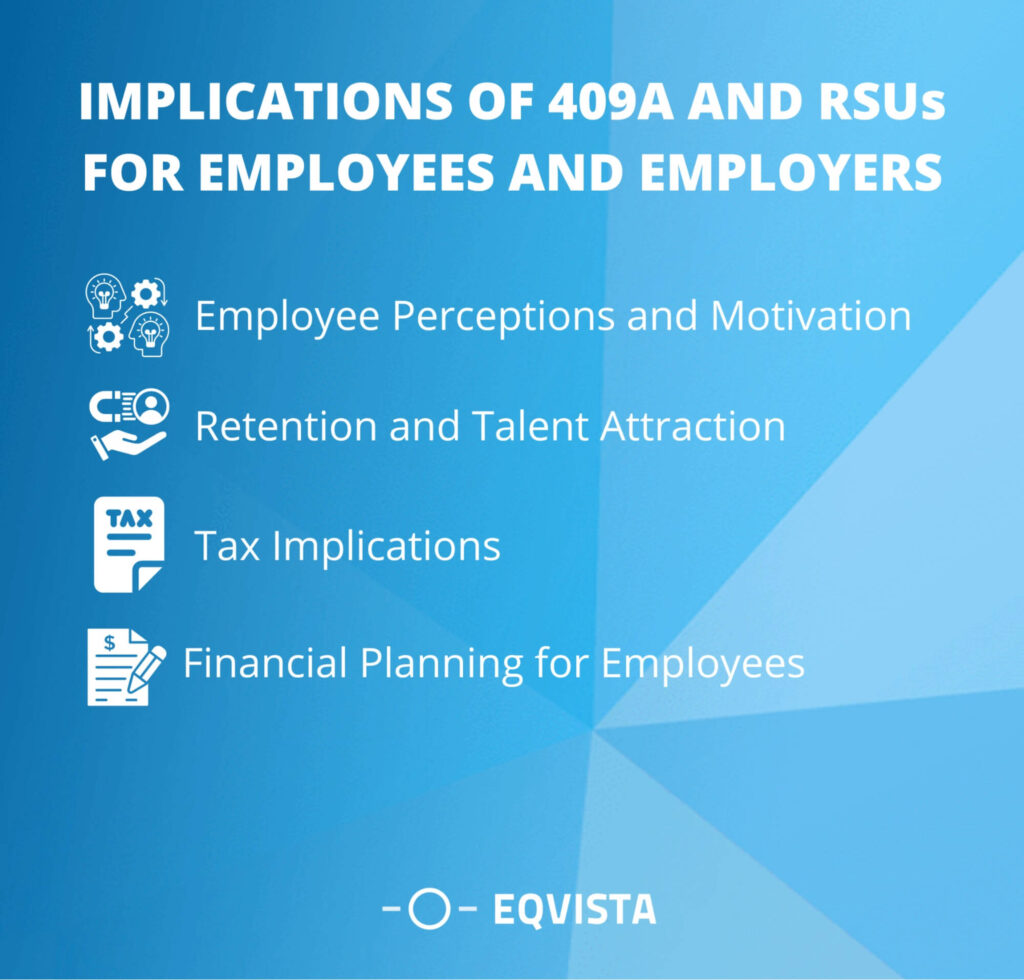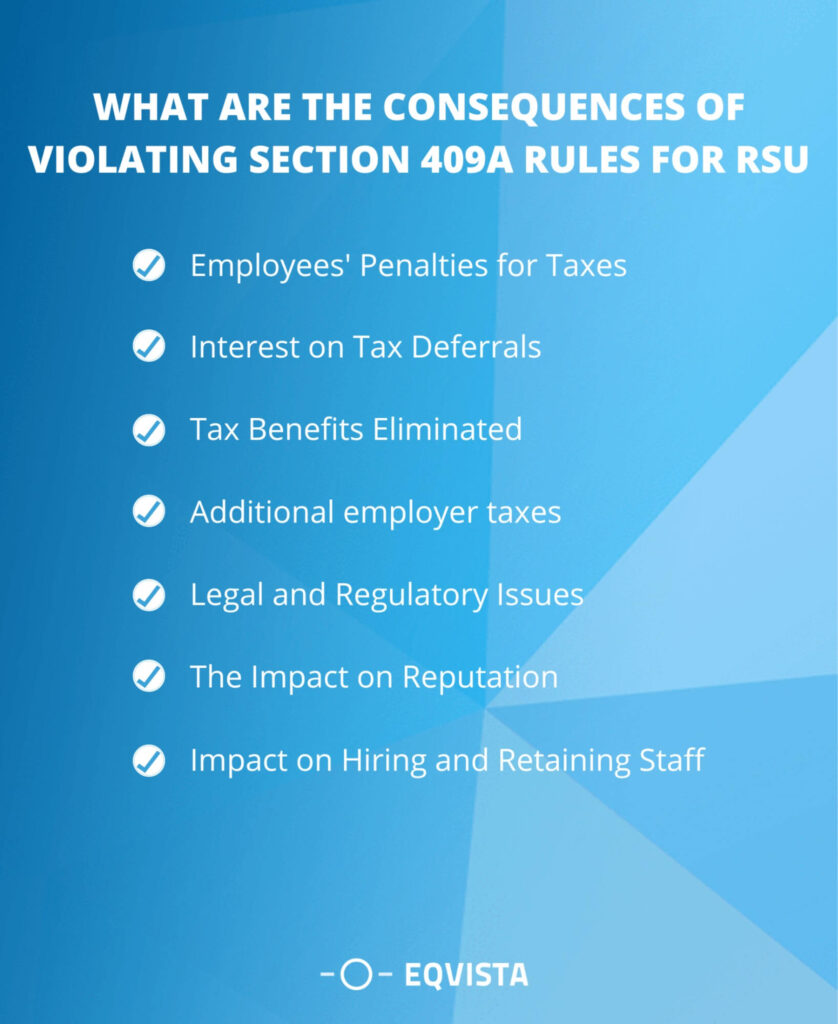Understanding 409a valuation and vesting requirements of RSU
This article will help you understand the necessary and 409a valuation and vesting requirements for RSUs.
As a strategic imperative, it is very critical to comprehend the intricacies of financial instruments. In this situation, 409A value and Restricted Stock Units (RSUs) are two important ideas that shape the connection between employers and workers.
While the latter, RSUs, constitute a special kind of equity pay with far-reaching ramifications for employees, the former, a careful assessment of a company’s stock value, is obligatory by tax laws.
Companies must prioritize valuation compliance to fully comply with tax regulations and create an atmosphere that can recruit and retain top personnel through RSUs. Similarly, to manage their finances effectively, workers need to understand the tax consequences and how they relate to their income. This article will help you understand the necessary and 409a valuation and vesting requirements for RSUs.
409a valuation and RSU Vesting
Stock units are a great way for businesses to recruit top personnel, but how do they decide how much a common share is worth? The only way for a privately-held corporation to give stocks to workers tax-free is through the valuation.
For RSUs, a 409A valuation is not required if using double-trigger vesting, but may be needed with single trigger vesting or deferred payment plans.
Does 409a apply to vesting requirements of RSU?
Yes. Section 409 A’s nonqualified deferred compensation requirements will apply to the RSU if it is not eligible for the short-term deferral exception, for example, if payment is scheduled more than 2.5 months after the year of vesting. The complicated and rigorous section 409A regulations necessitate meticulous analysis when running nonqualified deferred compensation schemes.
It is advisable to have a 409A valuation done annually to determine FMV of common stock for tax purposes. Employers should seek the advice of a tax professional and conduct routine reviews of any nonqualified deferred compensation programs to ensure they comply with section regulations. It might lead to income inclusion upon vesting and a 20% penalty tax for employees in case of a violation.
RSU Basics
Restricted stock units represent an agreement to transfer shares or pay cash later, usually upon fulfilling performance or time vesting conditions. When awarded, this does not constitute legal ownership in the corporation. Rather, the cash or share transfer takes place after vesting.
- Non-Dilution of Ownership – In order to motivate employees without diluting ownership, RSUs are a good option because equity ownership does not transfer immediately. Before the receiver can enjoy the shares or cash, they must meet specific vesting requirements corresponding to time or performance.
- Employee Retention – This encourages workers to remain with the firm until the vesting date and help grow its value to get a larger payout when their ISUs mature. Unlike stock options, employees and employers prefer RSUs because they do not need the beneficiary’s monetary investment (the exercise price).
Aligning 409A Valuation with RSU Vesting requirements
Companies that prioritize equity and transparency in RSU issuance ensure that the grants are in line with fair prices through thorough valuation processes. It is not easy to achieve this alignment, though. Here, we look into ways to avoid problems at the junction of valuation and issuance and resolve any possible disparities.
How to Ensure Fair Market Value Alignment?
Keeping the following procedures in check will ensure that your RSU vesting requirement stands aligned with the Fair Market Value.

- Regular 409A Valuations – Implement a consistent schedule for valuations to keep pace with the dynamic nature of the business environment. Frequent valuations provide an up-to-date understanding of the company’s worth, allowing for precise alignment with grants.
- Incorporating Company Performance Metrics – Consider incorporating performance metrics into the valuation process, linking grants to the company’s achievements. This alignment fosters a direct connection between employee incentives and organizational success.
- Transparent Communication – Clearly communicate the factors influencing the valuation of RSUs to employees. Transparency builds trust and ensures that employees understand the correlation between their contributions, company performance, and the value of their grants.
Challenges Of 409A Valuation for RSU Vesting
409a valuations for RSUs are certainly not without a few challenges. Here are ways you can address them.

- Rapid Response to Market Changes– Stay vigilant to market fluctuations and respond promptly with adjustments to the valuation process. This proactive approach minimizes discrepancies between RSU grant values and market conditions.
- Regular Internal Audits – Conduct regular internal audits to identify and rectify potential discrepancies in the valuation process. Internal checks enhance the accuracy of valuation models, reducing the likelihood of challenges arising later.
- Establishing a Clear Dispute Resolution Process – Anticipate potential disputes regarding RSU valuations and set a clear, fair, and transparent dispute resolution process. A well-defined process helps address discrepancies efficiently, minimizing disruption and fostering a positive employee experience.
- Employee Feedback Mechanisms – Create channels for employees to provide feedback on the valuation process. Actively seeking input can uncover challenges or concerns, enabling the company to address issues proactively.
How 409A Valuation Affects RSU Grant Values
One of the most important factors in determining the value of RSU grants is the 409A valuation, which determines the fair market value (FMV) of a company’s ordinary stock. For calculations, the FMV is the starting point, so equity-based compensation is given at a price commensurate with the company’s value.
When you get grants (often tied to vesting periods), it affects their value directly. A 409A valuation lets organizations set vesting schedules mutually beneficial to employees and the company by providing a standard for calculating the starting value of RSUs.
Implications of 409A and RSU for Employees and Employers
There are significant consequences for people and businesses regarding the relationship between 409A valuation and RSU award values. Businesses may improve their pay plans, and workers can make better financial decisions for their careers when there is open communication, strategic planning, and a focus on the relationship.

- Employee Perceptions and Motivation – Transparent communication about 409A valuation results and the subsequent impact on grants is essential for managing employee expectations. Employees who understand the link between valuation and compensation are likely to perceive equity awards as fair and motivating.
- Retention and Talent Attraction – Accurate 409A valuations contribute to fair and competitive RSU grant values, enhancing the effectiveness of equity-based compensation in attracting and retaining top talent. Employers must be mindful of industry benchmarks and market trends to remain competitive in the talent landscape.
- Tax Implications – 409A valuation directly influences the tax implications for employees upon the vesting of RSUs. Employers should educate their workforce on the tax consequences associated with grants, helping employees make informed financial decisions.
- Financial Planning for Employees – Employees relying on restricted stock units as a significant component of their compensation package must consider valuations in their financial planning. Awareness of the valuation process empowers employees to make informed decisions about their long-term financial strategies.
Do you need a 409a valuation for Issuing RSUs?
Yes, obtaining a valuation is typically a crucial step before issuing Restricted Stock Units. Section 409A of the Internal Revenue Code mandates that private companies must determine the fair market value of their common stock to grant equity-based compensation.
Here’s why a valuation is necessary for issuing RSUs:
- Section 409A imposes strict rules and regulations on the taxation of deferred compensation.
- The fair market value determined through the 409A valuation is the basis for pricing.
- Failure to comply with Section 409A can result in penalties and additional employee taxes. If RSUs granted at a value later prove inaccurate, it may lead to unexpected tax liabilities for employees upon vesting.
- A transparent and compliant approach to Restricted Stock Unit issuance, backed by a valuation, demonstrates the company’s commitment to fair and accurate valuation practices, contributing to a positive perception of the equity compensation program.
What are the consequences of violating section 409a rules for RSU?
When it comes to Restricted Stock Units, violating Section 409A regulations can have substantial repercussions for both employers and workers. If a restricted stock unit violates the regulations outlined in Section 409A, the following may occur:

- Employees’ Penalties for Taxes – Before the stock vests, employees who receive RSUs in a way that does not comply with Section 409A may be subject to immediate taxes on their value. On top of the possible state fines, there is also a 20% federal tax penalty for paying taxes early.
- Interest on Tax Deferrals – Employees’ deferred tax liabilities may be subject to interest starting on the initial tax due date if RSUs violate Section 409A.
- Tax Benefits Eliminated – Employees may face higher tax rates if RSUs fail to comply with Section 409A standards, which are necessary for eligible deferred compensation plans to maintain their favorable tax status.
- Additional employer taxes – Noncompliance with Section 409A regulations can result in penalties for employers, such as increased employer taxes. It may include a 20% income tax on the employee’s income.
- Legal and Regulatory Issues – Legal issues and regulatory attention might result from violations of Section 409A. If a business does not follow the guidelines, the IRS can audit and punish them.
- The Impact on Reputation – The company’s image might take a hit if employees fail to comply. Overall, the employer-employee relationship could suffer if employees stop believing the remuneration procedures are honest and fair.
- Impact on Hiring and Retaining Staff – Because of the potential financial and tax consequences of non-compliant Restricted Stock Units, companies with a track record of Section breaches may have difficulty attracting and retaining top personnel.
Get a 409a valuation for your stock options from Eqvista!
Businesses must follow Section 409A regulations when they design and manage RSU programs because of the seriousness of these repercussions. To do this, it is normal practice to have independent valuation experts assess the company’s shares monthly and adjust RSU awards accordingly. You may reduce the chances of Section 409A infractions by keeping yourself updated and following best practices.
Conducting a proper 409A valuation by experts is essential to set accurate exercise prices for stock options and avoid tax penalitiesFor a wide range of clients, Eqvista has conducted company appraisals. Our professional staff knows how to acquire your company’s value using the finest approaches. Our valuation reports are of excellent quality, and we also provide them at reasonable costs. Seeking credible 409A valuation partners? For a free consultation, please contact us immediately.
Interested in issuing & managing shares?
If you want to start issuing and managing shares, Try out our Eqvista App, it is free and all online!
